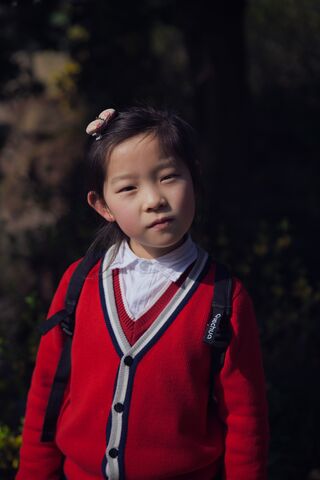
Source: Jerry Wang/Unsplash
Wanting to raise star children is not new, but a significant number of parents in China have taken pushing their offspring to a new level. Jiwa parenting, as its come to be called, raises parental anxiety, and it can be expensive, too.
The name is derived from a decades-old untested medical treatment of injecting chicken blood into humans to stimulate energy. The literal translation of jiwa is pumping children with chicken blood (to motivate them to learn), explains Dr. Xuan Li, an assistant professor of psychology at New York University Shanghai. Translating it less literally, we may understand it as pushing kids to succeed to be the best.
Dr. Li and Dr. Lixin Ren, an associate professor of early childhood education at East China Normal University, point out that jiwa parenting shares similarities with tiger mom or helicopter parenting, but that there are differences as well. Whats particularly salient in jiwa parenting is parents strong sense of moral responsibility for helping their children to succeed and heavy emphasis on the academic aspect of child development, which is quite different from tiger parenting that emphasizes parental power and authority over children. Dr. Li says, The term jiwa parenting is infused with a strong sense of stress and anxiety for the parents who feel the necessity to motivate their children even without agreeing to, liking it, or enjoying it themselves.
A nationwide study in Chinas Blue Book of Children reports that 60.4% of Chinese children aged 3 to 15 years participated in after-school education programs, with academic tutoring being the one that took up the most time. According to The Global Times, the trend has led many parents to sign kids up for costly tutoring, as they feel pressure to do so because other parents are doing the same. The state-owned paper and National Public Radio explain that parents are anxious their children will fall behind if they don’t sign up.
Jiwa parents investment in tutoring for their kids is significant. The BiPartisan Report, a weekly news digest, suggests parents spend 25 to 50 percent of their income on supplemental education, most of it for after-school private academic tutoring which has become a multi-billion-dollar business in China.
The Chinese Government Cracks Down on Private Tutoring
As part of sweeping regulations in many sectors outlined in the Washington Post, the Chinese government banned for-profit tutoring companies. The State Council and the Communist Party have asserted that they believe by greatly restricting the number of programs they can not only stem educational inequality, but also increase Chinas low birth rate.
Relaxing the countrys infamous one-child policy, which became a two-child policy and is now a three-child policy, has had little effect. The thinking behind the new rulings is that if parents are not spending exorbitant amounts of money on expensive educational tutors, they will have more disposable income and have more children to boost Chinas birth rate. The cost of raising child, especially in Chinas urban cities, is high and out of reach for many parents.
President Xi Jinpings crackdown will also likely not affect those who can afford private tutoring. Jiwa parents will undoubtedly find ways around the new regulations, notes Dr. Ren, particularly parents who are deeply concerned about their childrens future economic security.
Fear of Falling Behind
Dr. Ren, who has studied the effect of extracurricular activities on preschoolers, told NPR, Every time I hear the word jiwa, I feel a very strong sense of anxiety, stress, fear and exhaustion. [There is a sense among parents] I feel that if I dont move forward, I will fall behind.
In Dr. Ren and Dr. Lis studies of preschoolers found that increasing the level of participation in extracurricular activities could benefit children’s cognitive and language development to some extent, but over-scheduling children could decrease the benefits of extracurricular participation or even generate negative effects on child development. They point out that parental expectations for performance tend to increase as kids get older. Jiwa parents squeeze out almost all of school-age kids free time by scheduling hours of after-school programs, primarily tutoring. Parents who take this approach are relentless in terms of the time, money and energy they invest to see their offspring succeed.
Will Chicken Blood Parenting Come to the U.S?
So will this parenting trend take hold here?
There are specific aspects about the culture and social realities in China that may have driven this push to the extreme. Chinese parents tend to believe in effort over talent and see education as a route to higher education and social mobility, Dr. Li told me.
Parenting Essential Reads
While helicopter parenting describes intensive involvement in every aspect of children’s lives, jiwa parenting mainly concerns deep involvement in a child’s learning propelled by parents high expectations for their achievement, she adds.
Dr. Li and Dr. Ren remind us that the intensive parenting approach isnt new or uniquely Chinese. Parents around the world, and in the U.S., have adopted this approach often without even realizing it. Think: US middle-class parents who send their children to Japanese Kumon programs, Chinese classes, or Russian-style math camps, or Korean parents who send their children to endless cram schools.
But that doesnt mean its good for kids or parents when so much emphasis is placed on academics. That is only one aspect of a childs development and his or her chances for success.
As you know, Psychology Today no longer accepts comments on this site, however, you can comment (and I hope you will) on my Facebook page. By following me on Facebook, you can comment on this, recent and future posts. I look forward to what you have to say.

